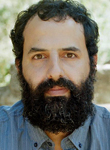'Digital roundtable' brings Israeli writers to campus
By Linda B. Glaser

A “digital roundtable” held Nov. 14 is the latest example of how 21st century technology is breaking down international borders and transforming Cornell’s campus in the humanities as well as the sciences.
“New Mizrahi Writing in Israel: Digital Roundtable,” held in a Martha Van Rensselaer Hall videoconferencing facility, brought together writers on three continents to discuss the contemporary Israeli literary scene for an on-campus audience of students and faculty. The writers were chosen, said organizer Deborah Starr, because their work grapples with the cultural and linguistic heritage of their families who immigrated to Israel from Arab or Muslim countries (termed “Mizrahi Jews”).
“The webcast panel offered students in Ithaca a glimpse into the vibrant Israeli literary scene,” said Starr, professor of modern Hebrew and Arabic literature in the Department of Near Eastern Studies. “And it gave the writers a chance to get to know each other. It was a pretty lively discussion, as they had very different points of view.”
Michal Held, poet and scholar of Ladino, participated from Jerusalem, and began the event by reading a poem in Hebrew and English that she called a “manifesto” against not being categorized “Mizrahi.”
Her manifesto was echoed by Sami Berdugo, participating from Berlin, who read a poem in Hebrew, Arabic and English that reflected his ambivalence toward Hebrew and his Israeli identity. “I feel I have no community in Israel, religious, Mizrahi, sexual or other,” he said, adding “no category applies to me.”
Poet Anat Zecharia, calling in from Tel Aviv, said she agreed with Berdugo. When someone reads her poems “as a manifesto of feminism or as an Israeli poet or as a Mizrahi poet, it makes him see maybe the end of the poem, but he never gets down deep to what I mean or think.”
But Almog Behar, award-winning author and poet and a visiting scholar at Cornell, said, “For me, you can be Mizrahi and Israeli and Jewish and Arabic and so on and they don’t contradict each other.” He noted that in the previous generation, “calling people 'Mizrahi writers' was a limiting title that was meant to place them in a narrow place in Israeli culture which would be marginalized within Israeli literature … but as a self-definition it also has the power to broaden Israeli literature. It allows us to connect with parts of our literature that were hidden from us.”
Poet and playwright Mati Shemoelof, participating from Tel Aviv, said he has begun writing in prose “to find a new place in the culture so the categories focused on my writing will be different. In my prose I am less aware of the categories and try to write less politically and more freely than before.” Still, he added, “I’m proud that my work until now has been Mizrahi work. I’m proud of my ethnicity.”
The roundtable was sponsored by the Department of Near Eastern Studies, the Jewish Studies Program and the Society for the Humanities, with support from the Hope and Eli Hurowitz Fund. Behar’s visiting scholar appointment is funded by the Shusterman Foundation.
Linda B. Glaser is staff writer for the College of Arts and Sciences.
Media Contact
Get Cornell news delivered right to your inbox.
Subscribe